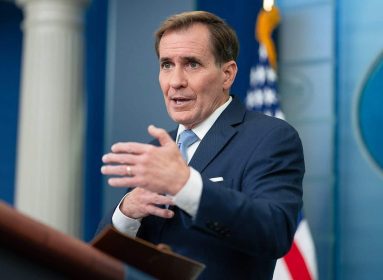
By Ron Kampeas
With this article, the Ledger launches its “Election 2016” coverage of next year’s presidential election. In the July 17 issue, we take a look at Republican presidential candidate Donald Trump’s ties to Israel.
WASHINGTON (JTA) – From the man who married her grandmother to the man who married her daughter, from working a room full of bar mitzvah guests on behalf of her husband’s political career to headlining major pro-Israel events during her own, Hillary Rodham Clinton’s journey has never wandered far from Jews.
Clinton’s Jewish encounters have been a natural consequence of her East Coast education, her trajectory in the party favored by a substantial majority of Jewish-Americans, and her embrace of the Jewish narrative of triumphing over adversity and bigotry, longtime friends of the 2016 presidential candidate say.
Sara Ehrman, whose friendship with the Democratic front-runner dates back more than four decades, told JTA that the Clintons, upon arriving in Arkansas in the mid-1970s, quickly established ties with leaders of the state’s tiny Jewish community.
“They were a smart, educated young couple … who had come down to this wonderful little city,” said Ehrman, now 96, referring to Little Rock. “The Jews gravitated to them. Among her best and most fervent supporters were Jews.”
The Clintons would attend seders at the homes of Jewish friends during their Little Rock years, and in 1988 Bill Clinton as governor co-officiated with Rabbi Zeke Palnick of Arkansas’ capital city at the Jewish wedding of Richard and Sheila Bronfman.
The Clintons are “both very spiritual and they tend to like to experience different cultures around them,” Sheila Bronfman, who traveled the country to campaign for Bill Clinton in 1992 and 1996, and for Hillary Clinton in 2008. (Plans are underway for a road trip in advance of the 2016 presidential election, she said.)
During Hillary Clinton’s 2000 U.S. Senate campaign, Paul Fray, Bill Clinton’s campaign manager in the ’74 race, told a writer that Hillary Rodham, in a heated argument on election night as it became clear that Clinton would be defeated, called Fray a “f***ing Jew bastard.” Both Clintons have vehemently denied the charge, and noted that they had fallen out with Fray after the campaign. They also said that they had no idea Fray was one-eighth Jewish.
A year after the loss, the couple were married by a Methodist minister in their Fayetteville living room. The following year, Bill Clinton became the state’s attorney general, and two years after that he was elected governor of Arkansas.
The Jewish sensibility permeated the Clinton White House, where the first couple inaugurated the annual Chanukah party in 1993, in part because of the abundance of Jewish staffers. They included communications chief Ann Lewis, senior adviser Rahm Emanuel, Jack Lew, a special assistant to President Clinton who would go on to become Treasury secretary under President Barack Obama, and Ron Klain, the chief of staff to Vice President Al Gore and now Obama’s Ebola czar. Unlike the formal Chanukah parties inaugurated by President George W. Bush and continued by Obama, these were for staffers and their families, although on occasion children from Washington-area Jewish day schools made an appearance.
The Clintons’ first Israel visit, with a church group in 1981, also included the West Bank. Approaching Bill Clinton’s presidential run in 1992, they reached out to the American Israel Public Affairs Committee, and AIPAC helped set up a meeting with Martin Indyk, a former staffer who founded the Washington Institute for Near East Policy think tank. The trio hit it off — the meeting ran hours overtime as both Clintons peppered Indyk with questions, according to a source who was present. Indyk went on to become the U.S. ambassador to Israel and Clinton’s top Middle East peace negotiator.
Bill Clinton’s embrace of the Oslo Accords between Israel and the Palestine Liberation Organization — initiated by the government of Israeli Prime Minister Yitzhak Rabin — further strengthened the couple’s ties to national Jewish groups.
Hillary Clinton’s eight years in the Senate representing New York cemented those ties. Her pro-Israel advocacy included exposing incitement in Palestinian media and helping to win full membership for Magen David Adom in the International Committee of the Red Cross. She also blamed the Palestinians, and not the Israelis, for the collapse of the 2000 Camp David peace talks and the subsequent second intifada.
Her advocacy followed the headline-making fallout from an appearance by Hillary Clinton in 1999 at an event with Suha Arafat, the wife of the Palestinian leader Yasser Arafat. Speaking in Arabic, Suha Arafat accused Israel of poisoning Arab children. Clinton, listening to a translation on headphones, did not react and kissed Suha Arafat after her remarks. Clinton claimed that she did not hear the reference to poisoning; she noted that others in the room missed it, too. The subsequent tabloid attention rattled her.
“I had learned a hard lesson about the hazards of merging my role in the international diplomatic arena with the complexities of local New York politics,” she wrote in her book, Living History.
For her 2016 bid, Clinton has lined up pro-Israel funding powerhouses who helped fuel her ’08 bid, like entertainment mogul Haim Saban, and has added some of Obama’s most prominent Jewish bundlers, notably movie executive Jeffrey Katzenberg. Lewis, the former White House communications chief, leads her Jewish outreach.
The 1992 election swept into Congress the largest class of Jewish lawmakers ever, 51. Among them was Rep. Marjorie Margolies, D-Pa., who served a single term before being ousted in the Republican takeover of the House in ’94. Her opponents raised the issue of Margolies’ tie-breaking vote in 1993 passing Bill Clinton’s unpopular tax bill. The Clintons campaigned for Margolies in her 2014 congressional bid; she lost in the primaries. Neither Hillary Clinton’s office nor Margolies responded to requests for comment. Margolies’ son, Marc Mezvinsky, met the Clintons’ daughter, Chelsea, when they were children at a political retreat, and fell in love when they met again at Stanford University. At their wedding, co-officiating was Rabbi James Ponet, the head rabbi at Yale.
Ponet chatted only briefly with Hillary Clinton at the wedding, but got to know her more recently at a memorial for the philanthropist Edgar Bronfman. Ponet in an interview with JTA said Clinton spoke with sensitivity about Bronfman’s efforts to make Swiss banks accountable for Holocaust-era Jewish assets.
“There’s a sense of foundational connection to the Jewish people and a sense of the responsibility to the Jewish people in the world,” he said.
Ponet also described a pre-wedding meeting with the young couple and discussing the chuppah. The rabbi advised the couple that any cloth with meaning to the family could serve as a wedding canopy.
“Marc said, ‘My bar mitzvah tallit, that could be used, but I don’t know where it is’,” Ponet recalled. “Chelsea said, ‘I know where it is.’”
CAP: Hillary Clinton speaking at an AIPAC conference in Washington, D.C.








 Southern New England Jewish Ledger
Southern New England Jewish Ledger









